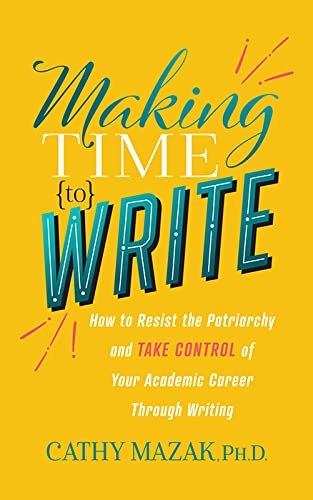
Book Review: Making Time to Write by Cathy Mazak
I’m here with another book review today! After feeling the need to write about “The slow professor”, I realized I had not explicitly sung the praises of Cathy Mazak’s “Making Time to Write“. We also got the chance to interview Cathy Mazak for the PhD Talk podcast and so much of what she said rang true for me, so go listen to the episode and make sure you read her book.
Making Time to Write argues that writing is a way to resist the patriarchy and the neoliberal university. While the book provides practical advice and strategies for academics to make writing a priority in their work days, it is also a call to action for all marginalized individuals to claim their space and their voice.
Mazak’s argument is clear and well-supported. She emphasizes that writing is not just a personal pursuit, but a political one. She writes, “Writing is an act of resistance against the patriarchy, against the neoliberal university, against the structures that tell us we are not enough“. Mazak contends that the patriarchal system is designed to silence voices and limit access to power. She argues that writing, and making time to write, is a way to push back against these limitations and claim a space for ourselves and our ideas.
In addition to her compelling argument, Mazak’s practical advice and strategies make Making Time to Write an excellent resource for academics. The book is divided into three parts: Finding Time to Write, Overcoming Writing Challenges, and Making Writing a Sustainable Habit. Here are six of the best tips from the book that called my attention:
- Create a writing schedule that works for you: Mazak suggests finding a time of day that works best for you to write and creating a schedule that is realistic and achievable. Don’t push writing to the weekends and early mornings or evenings, but put it in your actual work days.
- Break down larger writing projects: Large writing projects can be overwhelming. Mazak recommends breaking them down into smaller, more achievable tasks to make them more manageable. While this advice is something we have all heard before, it’s tried and tested and true – so it’s a good reminder for all of us.
- Use prompts and exercises to generate new ideas: Sometimes the hardest part of writing is getting started. Mazak provides prompts and exercises to help writers generate new ideas and overcome writer’s block. I loved her advice on thinking about my publishing pipeline.
- Find a writing buddy or group: Accountability can be a powerful motivator. Mazak recommends finding a writing buddy or joining a writing group to stay motivated and on track. This advice is in line with the programs that Scholar’s Voice offers, where group writing sessions are one of the ingredients to get writing back on track.
- Practice self-care: Writing can be emotionally taxing. Mazak advises taking breaks when needed and practicing self-care to avoid burnout. Taking care of ourselves in a culture of overwhelm is an act of rebellion as well – and this is something I have been thinking about a lot after reading her book.
- Frame writing as an act of resistance: Mazak argues that writing is an act of resistance against the patriarchy and the neoliberal university. By framing writing in this way, she empowers writers to claim their space and their voice.
One of the strengths of Making Time to Write is that Mazak focuses on the experiences of marginalized writers. She acknowledges the unique challenges faced by academic parents, women, people of color, and others who are traditionally underrepresented in academia. Mazak writes, “I want to offer a feminist, antiracist, pro-parent, pro-graduate student, pro-contingent faculty approach to writing”. This focus on inclusivity and diversity makes the book an invaluable resource for all writers who are looking to find their voice and make time for writing – and that’s why I wanted to highlight this book today after the much less intersectional “Slow professor” I reviewed last week.
Overall, I found Making Time to Write to be an interesting and enjoyable book. Mazak’s argument that writing is an act of resistance is compelling and empowering, and her practical advice and strategies are easy to implement. The book is well-organized and easy to follow, and Mazak’s writing is engaging and accessible.
My overall rating of Making Time to Write is 4/5. I appreciate that Mazak focuses on minorities and academic parents and offers a feminist, antiracist approach to writing. Her argument that writing and taking care of ourselves are acts of resistance is compelling, and her practical advice and strategies are helpful for writers at all levels.



